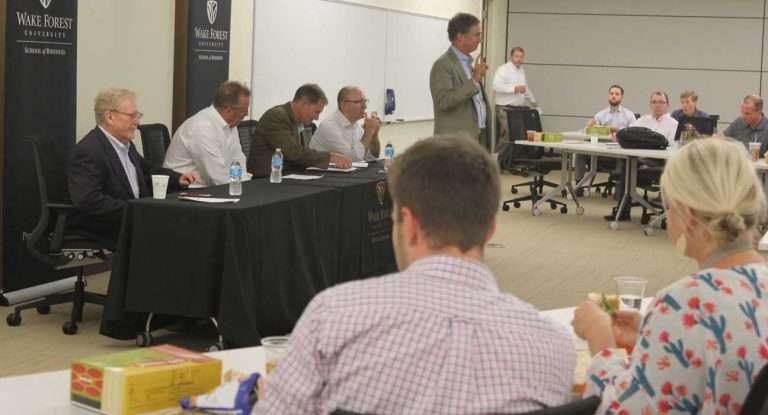Reversing the elevator pitch: Gain insight from investors

By Stephanie Skordas, Sr. Associate Director, Communications
While most entrepreneurs know the value of a perfectly polished elevator pitch, getting insights on what investors are looking for could be the difference between closing a deal and closing their business.
A lunch and learn on July 15 at the Wake Forest University Charlotte Center brought a distinguished panel of angel investors, venture capitalists and bridge investors together to offer a behind-the-scenes look at the criteria they use to evaluate investment opportunities and assess those elevator pitches. About 70 students, alumni, prospective students, and members of the business community listened to a panel moderated by Stan Mandel, executive professor in entrepreneurship at the School of Business.
- Greg Brown, president, Cardinal Finance, LLC
- David Gilroy, managing director and co-founder, Scale Finance, LLC
- Don Rainey, general partner, Grotech Ventures
Rainey, who has been a venture capitalist for 17 years, said he can distinguish between winning and questionable investments at the pitch stage. “I look for one thing: have they achieved some progress that they would not be expected to have achieved at this stage? That indicates success, and the big winners always have that element.”
Gilroy said proposing an investment is selling equity in the venture, so sales presence is crucial. “The confidence level of the presenter is something you can feel in the room. It’s the sense of having not just heard and answered every question, but having lived and thought deeply about the business.”
Brown, whose investment group focuses on early-stage investments, said commitment is key. “If you work for a big company and are presenting something on the side, where’s the commitment? You won’t make the same progress unless you burn your boats and do it every day. No one wants to invest in your hobby.”
The panel discussed the importance of attracting customers, monetizing a business, and the valuation bubble, which they say has popped. Mandel led them into a discussion of where they see growth opportunities for entrepreneurs. “It’s more romantic to start a business,” said Gilroy, “but there’s something to be said for buying an existing business with cash flow.”
“There are a lot of people in their fifties who are going to have a hard time finding their exit strategies because all the 20-year-olds want to go to Silicon Valley and work at a unicorn,” Brown said. “I think there will be a lot of opportunity for young people who want to take over these successful family businesses.”
“I learned that having customers is more important than having revenue,” said Anitha Vojjala (MBA ’15) of the panel. She said the opportunity to hear directly from industry experts about their perspectives on valuation was beneficial.
Lisa Ganderson, who has a background in venture capital in Houston and currently consults for startups in the Charlotte area, participated in the Q&A session following the discussion. “Charlotte, for being such a financial market, lacks venture capital. Seeing the diverse sectors these investors and getting the chance to network with them was a valuable opportunity.”